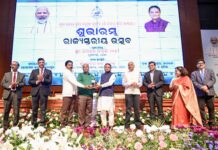By Our Correspondent
BERHAMPUR: The combined total wealth of 63 Indian billionaires is higher than the total Union Budget of India for the fiscal year 2018-19 which was at INR 24,42,200 crore, revealed a newreport from Oxfam on Wednesday ahead of the World Economic Forum (WEF) in Davos, Switzerland.
The world’s 2,153 billionaires have more wealth than the 4.6 billion people who make up 60 percent of the planet’s population, the report also showed.Oxfam’s report, ‘Time to Care’, shows how our sexist economies are fuelling the inequality crisis —enabling a wealthy elite to accumulate vast fortunes at the expense of ordinary people and particularly poor women and girls:
The top 1% of Indians hold more than 4 times the amount of wealth held by 953 million people (or the bottom 70% of the population).
It would take a female domestic worker 22,277 years to earn a top CEO of a Tech company, makes in one year. With earnings pegged at INR 106 per second, would make more in 10 minutes than what the domestic worker would make in one year.
Women and girls put in 3.26 billion hours of unpaid care work each and every day—a contribution to the Indian economy of at least INR 91,000 crore a year; almost equivalent to the entire education budget of India in 2019 (INR 93,000 crores).
Direct public investments in the care economy of 2% of GDP would potentially create 11 million new jobs. This would make up for the 11 million jobs lost in 2018.
As a part of the release of the report in odisha former chief secretary Sri Jugal Kishor Mohapatra appealed that safety work place with safe transport would increase women and girls participation in workforce. He appreciated the odisha government led MAMATA scheme which provides lots of opportunities to decrease gender inequality.
Former finance minister of Odisha Panchanan Kanungo said that more research and information mbased discussion of regional inequality should take place in Odisha. In this deliberation Professor Mitallichinnara and professor SwarnaMayeetripathy highlighted the need for enhanced remuneration for the women workers. There should be more opportunities to be created for the women and girls to participate in the works which can decrease inequality in the state.
Global inequality is shockingly entrenched and vast and the number of billionaires has doubled in the last decade, despite their combined wealth having declined just in the last year.
Women do more than three-quarters of all unpaid care work. They often have to work reduced hours or drop out of the workforce because of their care workload. Across the globe, 42 percent of women cannot get jobs because they are responsible for all the caregiving, compared to just six percent of men.
Women also make up two-thirds of the paid ‘care workforce’. Jobs such as nursery workers, domestic workers, and care assistants are often poorly paid, provide scant benefits, impose irregular hours, and can take a physical and emotional toll.
The pressure on carers, both unpaid and paid, is set to grow in the coming decade as the global population grows and age.Climate change could worsen the looming global care crisis —by 2025, up to 2.4 billion people will live in areas without enough water, and women and girls will have to walk even longer distances to fetch it. 80 percent of indigenous people live in Asia and the Pacific, a region vulnerable to climate change.
The report shows governments are massively under-taxing the wealthiest individuals and corporations and failing to collect revenues that could help lift the responsibility of care from women and tackle poverty and inequality.
At the same time, governments are underfunding vital public services and infrastructure that could help reduce women and girls’ workload. For example, investments in water and sanitation, electricity, childcare, healthcare could free up women’s time and improve their quality of life.
“Governments created the inequality crisis —they must act now to end it. They must ensure corporations and wealthy individuals pay their fair share of tax and increase investment in public services and infrastructure. They must pass laws to tackle the huge amount of care work done by women and girls, and ensure that people who do some of the most important jobs in our society —caring for our parents, our children and the most vulnerable— are paid a living wage. Governments must prioritize care as being as important as all other sectors in order to build more human economies that work for everyone, not just a fortunate few,” said Behar.
Oxfam’s calculations are based on the most up-to-date and comprehensive data sources available. Figures on the share of wealth come from the Credit Suisse Research Institute’s Global Wealth Databook 2019. Figures on the very richest in society come from Forbes’ 2019 Billionaires List. Billionaire wealth fell in the last year but has since recovered.
Oxfam is part of the Fight Inequality Alliance, a growing global coalition of civil society organizations and activists that will be holding events from 18-25 January in 30 countries, including India, Kenya, Mexico, Pakistan, South Africa, Uganda and the UK, to promote solutions to inequality and demand that economies work for everyone.
In this regard with the collaboration of State Inequality Alliance, Odisha and Coalition of Active Citizen Berhampur, Ganjam organized a campaign rally at Khallikote College Square, Berhampur at 10.00am to 1.00 pm with the participation of Coalition of Active Citizen member Kishore Ch. Patra, Guru Ch. Patra, Uma Prasad Bisoyi, Shankar Sahu, Manab Adhikar Surakshya Manch member Abani Gaya and other civil society members Bhal Chandra Sadangi, Raja Suresh and Surya Narayan Behera actively engaged in this campaign and from Youth for Social Devlopment Bibhu Prasad Sahu, Abhiram Kanhar, Nageswara Patra and Tapas Kumar Patra managed the programme effectively.






























